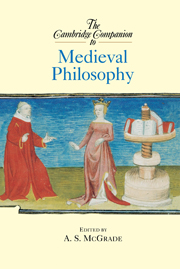Book contents
- Frontmatter
- Introduction
- 1 Medieval philosophy in context
- 2 Two medieval ideas: eternity and hierarchy
- 3 Language and logic
- 4 Philosophy in Islam
- 5 Jewish philosophy
- 6 Metaphysics: God and being
- 7 Creation and nature
- 8 Natures: the problem of universals
- 9 Human nature
- 10 The moral life
- 11 Ultimate goods: happiness, friendship, and bliss
- 12 Political philosophy
- 13 Medieval philosophy in later thought
- 14 Transmission and translation
- Chronology of philosophers and major events
- Biographies of Major Medieval Philosophers
- Bibliography
- Index
3 - Language and logic
Published online by Cambridge University Press: 28 May 2006
- Frontmatter
- Introduction
- 1 Medieval philosophy in context
- 2 Two medieval ideas: eternity and hierarchy
- 3 Language and logic
- 4 Philosophy in Islam
- 5 Jewish philosophy
- 6 Metaphysics: God and being
- 7 Creation and nature
- 8 Natures: the problem of universals
- 9 Human nature
- 10 The moral life
- 11 Ultimate goods: happiness, friendship, and bliss
- 12 Political philosophy
- 13 Medieval philosophy in later thought
- 14 Transmission and translation
- Chronology of philosophers and major events
- Biographies of Major Medieval Philosophers
- Bibliography
- Index
Summary
It is impossible to overestimate the importance of the study of language and logic for the understanding of medieval philosophers and theologians. Many of the subjects discussed by grammarians and logicians are of interest in themselves and have an obvious relevance to theological and scientific problems, but at a deeper level, all the writing and thinking of the period is permeated by a technical vocabulary, techniques of analysis, and inferential strategies drawn from the basic training in the liberal arts that every medieval student received. The nature of this training reveals two important features of medieval education. On the one hand, thinkers focused on authoritative texts - the Bible, the works of Aristotle and Augustine, Priscian's Institutiones grammaticae, Peter Lombard's Sentences - and the attempt to reconcile and reinterpret these authorities lies behind many developments.On the other hand, the method of teaching was largely oral, and this influenced written expression in many ways, from the philosophical dialogues of Augustine and Anselm to the highly structured disputational presentation of Aquinas's Summa theologiae.
One cannot capture the richness and complexity of medieval theories of language and logic in a short chapter. In what follows I shall first give a brief overview and then focus on a few principal themes.
- Type
- Chapter
- Information
- The Cambridge Companion to Medieval Philosophy , pp. 73 - 96Publisher: Cambridge University PressPrint publication year: 2003
- 2
- Cited by



